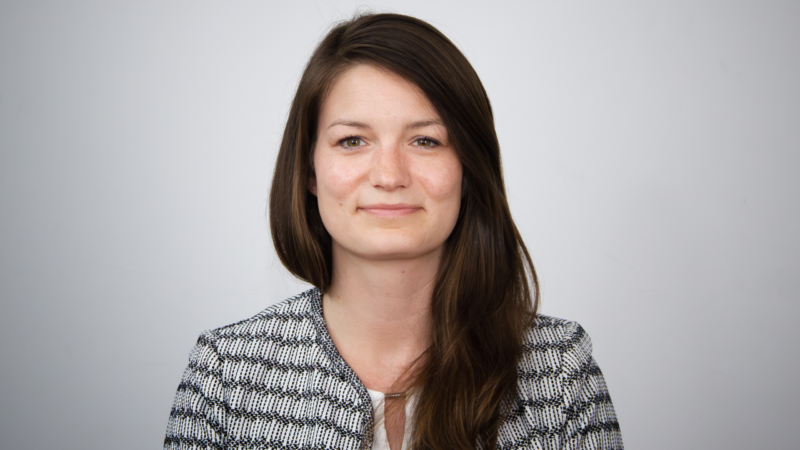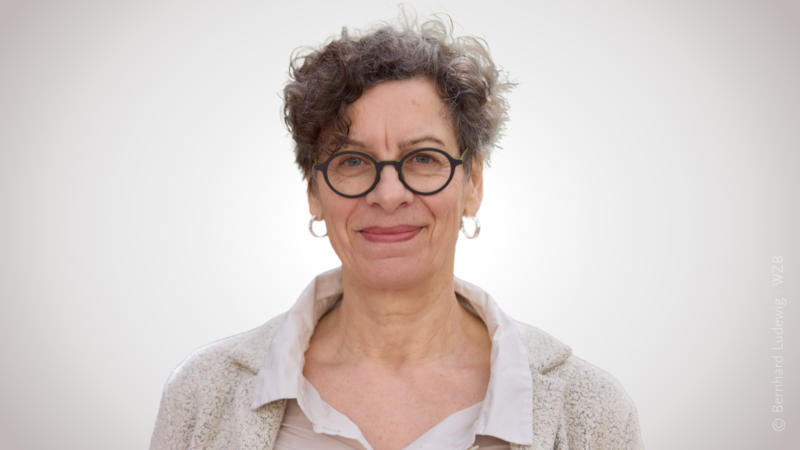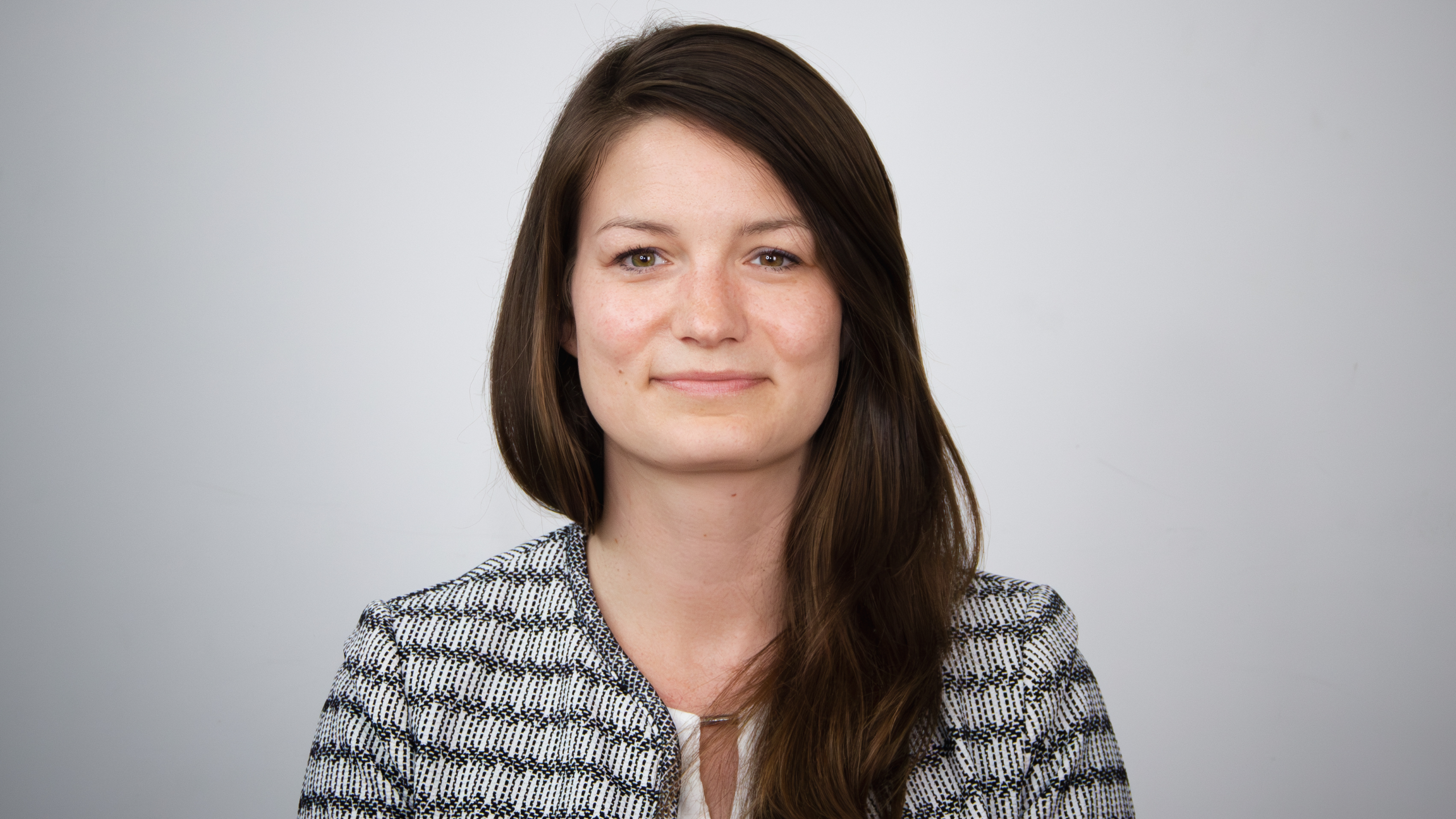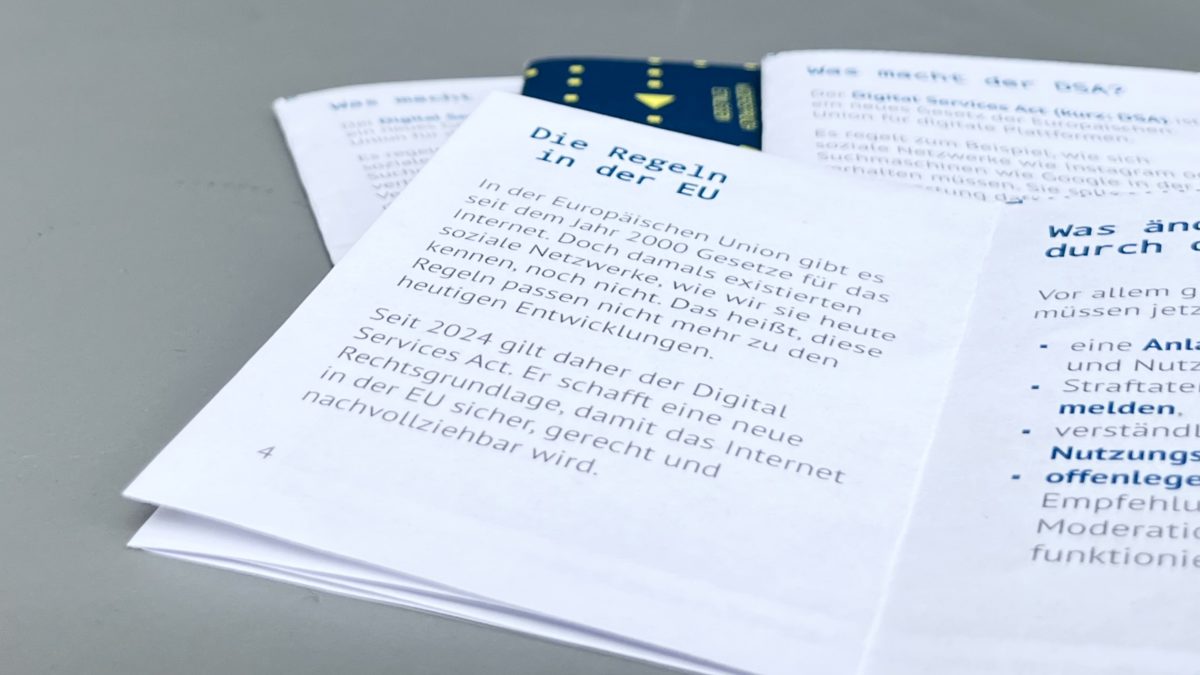
DSA research network
The introduction of the Digital Services Act (DSA) has ushered in a new era of platform regulation. Key questions on the impact and risk of online platforms on individual and collective (fundamental) rights and values have to be asked and answered. We are therefore focussing on the following questions: How can a good balance be struck between regulating harmful content like hate speech and ensuring freedom of expression in the digital space? Do risk-based governance approaches make sense?
To answer these questions that come with the enforcement of new laws like the DSA, the various stakeholders need to work together. For this, we need new modes of cooperation. Therefore, it becomes even more important to bring together different stakeholder groups like academia, civil society, think tanks, platforms and regulatory bodies.
Project goals
The DSA Research Network aims to establish a unique space for multi-stakeholder communication and collaboration on the implementation of the DSA. Together with experts from across Europe and beyond, we are monitoring the implementation of the Digital Services Act and studying its effects. And most importantly, we are making recommendations for its proper implementation and possible areas for reform – well before the reviews planned by EU institutions.
Following a network-based approach, the project sets out to add value to already existing initiatives that have been formed to accompany the process of implementation. By providing a platform for cross-sectoral dialogue between academics, practitioners, NGOs, and regulators, we facilitate the creation of actionable knowledge. At the same time, we foster a culture of collaboration.
Network and capacity buildingDevelopment of an interdisciplinary network for collaborative knowledge production and strategic analysis. Fostering cross-sectoral dialogue to consolidate the various efforts on the implementation of the DSA across Europe. | |
Evidence-based researchEstablishing a flexible and adaptive operational framework that accounts for the dynamics of the field. It encompasses a variety of key interaction mechanisms, research methodologies, stakeholder engagement, dissemination strategies, and governance principles. | |
Recommendations for reform proposalsEvidence-based research and transdisciplinary collaboration to enable well-founded decisions on the implementation of the legislation and future reforms. |
Stakeholder engagement
Based on a multi-stakeholder analysis, we have invited a variety of representatives from NGOs, regulatory bodies and academia to join the DSA Research Network’s Circle of Friends. With stakeholder meetings twice a year, the Circle of Friends provides the backbone of the project. It will serve as a sounding board for the research conducted within the project as well as for the further direction of the project.
28 April 2026 · Online
The fourth Circle of Friends meeting will be held in April 2026.
4 November 2025 · Online
The third Circle of Friends meeting focused on current DSA topics, such as data access challenges or reform proposals, particularly in view of the upcoming 2027 evaluation. Read the meeting recap to find out more.
14 April 2025 · Online
The second meeting builds on the foundations of the kick-off meeting and develops initial ideas further. Current DSA-related topics such as the effectiveness of risk mitigation measures and the independence of supervision at European level form the basis of the discussion. The most urgent need for further research is identified. Read more in the session's recap.
07 November 2024 · Online
The Kick-Off Meeting of the Circle of Friends was aimed at laying the foundation for the collaborative work moving forward. Together with NGOs, academia and regulatory bodies, we discussed emerging topics around the DSA and identified the most pressing needs for scientific insight. Learn more about these in the recap.
Third Circle of Friends meeting:
Digital Society Blog post:
Counting without accountability? An analysis of the DSA’s transparency reports
Digital Society Blog post:
Debunking assumptions about disinformation: Rethinking what we think we know
Digitaler Salon:
Verfassungsblog post:
Zine on platform regulation: What does the Digital Services Act (DSA) do?
Featured topics
Research activities
Risk-based governance approaches like the DSA aim to balance potentially conflicting policy objectives and ensuring a safe and transparent online environment. However, there are significant questions of how the risk-based approach can be operationalised in a democratic and inclusive way. Additionally, it remains to be seen if it can actually fulfil the expectations placed in it. In this focus point, we will conduct research on the following aspects of risk-based governance approaches:
| Assessment and evaluation framework for the risk-assessment procedures under the DSA based on mapping existing risk assessment approaches. These will be analysed along with the ongoing assessments. | |
| Critical analysis of the anticipated role of access to research data in informing the operationalisation of the systemic risk approach through Article 40 DSA. |
 Ann-Kathrin Watolla, Dr.Researcher: New Technologies and Future of Law
Ann-Kathrin Watolla, Dr.Researcher: New Technologies and Future of Law Jeanette Hofmann, Prof. Dr.Research Director
Jeanette Hofmann, Prof. Dr.Research Director John AlbertAssociated Researcher: New Technologies and Future of Law
John AlbertAssociated Researcher: New Technologies and Future of Law Matthias C. Kettemann, Prof. Dr. LL.M. (Harvard)Head of Research: New Technologies and Future of Law
Matthias C. Kettemann, Prof. Dr. LL.M. (Harvard)Head of Research: New Technologies and Future of Law Wolfgang Schulz, Prof. Dr.Research Director
Wolfgang Schulz, Prof. Dr.Research Director
University of Amsterdam
Leibniz-Institute for Media Research | Hans-Bredow-Institut
University of Amsterdam
Leibniz-Institute for Media Research | Hans-Bredow-Institut
University of Amsterdam
Journal articles and conference proceedings
Ollig, C. (2024). Report on the Academic Round Table, 30 April 2024, New York City: Freedom of Online Communication Across Transatlantic Borders. GRUR International. DOI: 10.1093/grurint/ikae106 Publication details
Other publications
Watolla, A., Zerrer, P., Rau, J., Merten L., Kettemann, M. C., & Puschmann, C. (2025). Gesellschaftliche Auswirkungen Systemischer Risiken. Demokratische Prozesse im Kontext von Desinformationen. Digital Services Coordinator Bundesnetzagentur. Publication details
Watolla, A. (2025). Debunking assumptions about disinformation: Rethinking what we think we know. Digital society blog. Publication details
Ohnesorge, J. (2025). Counting without accountability? An analysis of the DSA’s transparency reports. Digital society blog. Publication details
Watolla, A., & Kettemann, M. C. (2024). Navigating Platform Power: From European Elections to the Regulatory Future. Digital Society Blog. Publication details
Lectures and presentations
Social Media als Demokratiewächter? Was Plattformen bei Wahlen (nicht) tunLange Nacht der Wissenschaften 2025. Humboldt Institute for Internet and Society (HIIG), Berlin, Germany: 28.06.2025 Further information
Ann-Kathrin Watolla
DSA: Censorship or NotDoctoral Forum Digital Law. Universität Innsbruck, Joachim-Herz-Promotionskolleg (Leuphana Universität Lüneburg), IT:U- Interdisciplinary Transformation University Austria, Leibniz-Institut für Medienforschung | Hans-Bredow-Institut, Universität Heidelberg. Helmut-Schmidt-Stiftung, Hamburg, Germany: 17.06.2025
Matthias C. Kettemann
Plattformregulierung und Demokratie: Was Social Media Plattformen (nicht) tun, um die Integrität von Wahlen zu schützenre:publica 25: Generation XYZ. republica GmbH. STATION, Berlin, Germany: 28.05.2025 Further information
Ann-Kathrin Watolla
AI in Content Governance: Designing Optimal Human-Machine Interaction Scenarios under the DSASummer School on Artificial Intelligence and Law. Universität Tübingen, Tübingen, Germany: 13.05.2025
Matthias C. Kettemann
Organisation of events
Digitaler Salon: There's no app for that!30.07.2025. Humboldt Institute for Internet and Society, Berlin, Germany (National) Further information
Judith Beyer, Ann-Kathrin Watolla, Daniel Pothmann, Sarah Spitz
Lange Nacht der Wissenschaften 2025. Plattform-Parcours: Deine Rechte gegen Hate Speech & Falschinformationen28.06.2025. Humboldt Institute for Internet and Society, Berlin, Germany (National) Further information
Ann-Kathrin Watolla
Spotlight: Disinformation and the German electionwith attending Vip: Ann-Kathrin Watolla, Felix Kartte (Experts), John Albert (Moderation). 10.02.2025. Humboldt Institut für Internet und Gesellschaft, Online, Germany (International) Further information
Ann-Kathrin Watolla, Sarah Spitz
Digitaler Salon: Gesprächsklimawandel29.01.2025. Humboldt Institut für Internet und Gesellschaft, Berlin, Germany (National) Further information
Ann-Kathrin Watolla, Daniel Pothmann, Sarah Spitz, Matthias C. Kettemann
Spotlight: Community Notes statt Faktencheck16.01.2025. Humboldt Institut für Internet und Gesellschaft, Online, Germany (International) Further information
Sarah Spitz, Katharina Mosene, Matthias C. Kettemann, Jeanette Hofmann
Examining Freedom of Online Communication Across Transatlantic Borders30.04.2024. Columbia University, New York, United States of America. Co-Organised by: Columbia University (International) Further information
Christian Ollig, Wolfgang Schulz
Access all areas? Research data access under the DSAwith attending Vip: Dr. Konrad Kollnig and Dr. Aurelia Tamò-Larrieux. 23.04.2024. Zoom, Online, Only. Co-Organised by: Network of Centers (International) Further information
Vincent Hofmann
Platform Regulation and Democracies | Beyond Digital India Act, Marco Civil and DSAFrom 21.04.2024 to 28.04.2024. Centre for Communication Governance (CCG) of the National Law University Delhi (NLUD), New Delhi, India. Co-Organised by: Leibniz-Institute for Media Research | Hans-Bredow Institut (HBI), Alexander von Humboldt Institut für Internet und Gesellschaft, Rechtswissenschaftliche Fakultät der Universität Hamburg, Centre for Communication Governance (CCG) of the National Law University Delhi (NLUD), Instituto de Tecnologia e Sociedade do Rio (ITS Rio), UNESCO Chair on Freedom of Communication of Hamburg University, Global Network of Internet and Society Research Centers (NoC). (International) Further information
Vincent Hofmann, Wolfgang Schulz
Focus topic Digital Services Act (DSA)with attending Vip: Paddy Leerssen and Ilaria Buri. 26.03.2024. Zoom, Online, Only. Co-Organised by: Network of Centers (International) Further information
Vincent Hofmann
Digitaler Salon: Gekommen, um zu regeln28.02.2024. Humboldt Institute for Internet and Society, Berlin, Germany (National) Further information
Maximilian Lukat, Daniel Pothmann, Sarah Spitz
The basis of all good? New regulatory tools in DSA & Co.with attending Vip: Dr. Samson Esayas and Dr. Miloš Novović. 27.02.2024. Zoom, Online, Only. Co-Organised by: Network of Centers (International) Further information
Vincent Hofmann
-
Berliner Zeitung
Angriff auf die Meinungsfreiheit? Die EU verpflichtet digitale Dienste nun, gegen „Desinformation“ vorzugehen
-
Tagesspiegel
Meta schafft Factchecking ab: Welche Folgen hat Zuckerbergs Kehrtwende?
-
Deutschlandfunk Kultur
Jurist: US-Plattformen müssen europäischem Recht gehorchen
-
radio3 | rbb
Wie können die sozialen Medien faktensicher gemacht werden?
-
Heilbronner Stimme
Deutsche Faktenchecker kritisieren Kurswechsel bei Facebook und Instagram
-
WDR 5
Wer bändigt TikTok, X & Co? Europas Digitalgesetze im Stresstest
Project partner
The DSA Research Network is a collaboration between the Alexander von Humboldt Institute for Internet and Society, the Leibniz Institute for Media Research | Hans Bredow Institute, and the DSA Observatory.

The project is funded by Stiftung Mercator.
| Duration | 01 January 2024 - 31 December 2026 |
| Funding | Stiftung Mercator |








